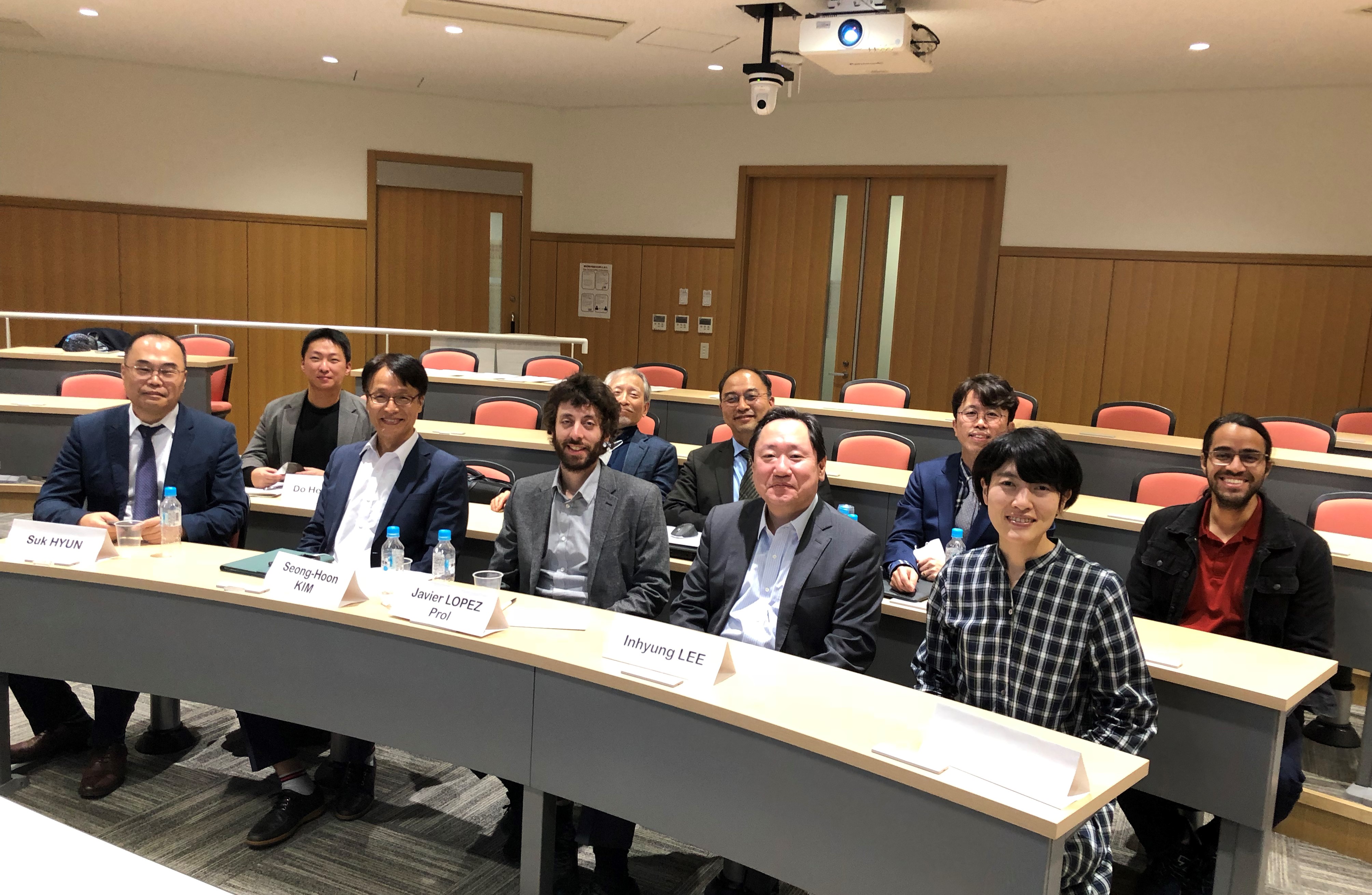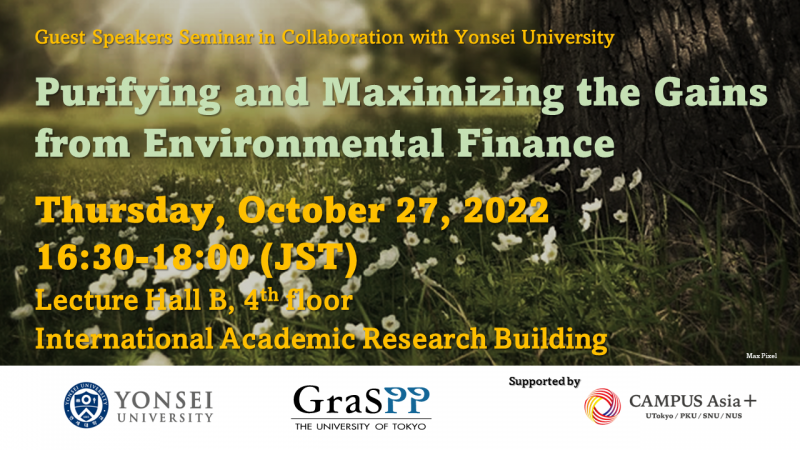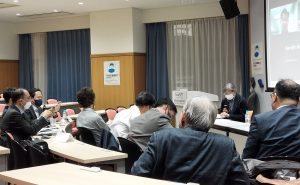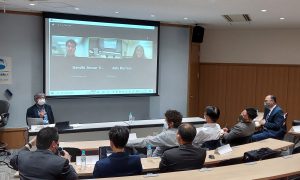This news article provides a summary and students’ feedback on the Guest Speakers Seminar titled “Purifying and Maximizing the Gains from Environmental Finance” on October 27, 2022, at GraSPP in Lecture Hall B of the International Academic Research Building on the Hongo campus.

Motivation for the seminar
Environmental finance has gradually gained popular support globally since the mid-2000s. Its momentum continues, as shown by the growing issuance of green bonds in recent years. People see it as a way to achieve the dual goal of environmental sustainability and financial sector contribution to the global climate change challenges. Environmental finance or green finance can potentially ensure better environmental outcomes by promoting green projects or minimizing the negative impacts on the environment and is aligned with the delivering efforts of the United Nations Sustainable Development Goals. However, there are concerns about a deceitful marketing approach in green finance called “greenwashing.”
GraSPP’s Guest Speakers Seminar, in collaboration with Yonsei University’s Graduate School of Environmental Finance, focuses on the potential pitfalls of green finance and discusses ways to purify and maximize the gains from such finance. The speakers from Korea addressed the performance of green finance and then set the agenda by asking, “How can we detect greenwashing?”
CAMPUS Asia plus supported this seminar. CAMPUS Asia stands for “Collective Action for Mobility Program of University Students in Asia.”

A summary of the discussion
“Green bond pricing factors in the Korean primary market: preliminary results” by Mr. Do Heon Kim and Prof. Suk Hyun, Graduate School of Environmental Finance, Yonsei University
The Korean primary bond market observed the favorable “greenium” or green premium on green bonds. The existence of greenium reflects a greater demand for green bonds over their supply than the demand for conventional bonds over their supply. This demand-supply differential implies the investors’ willingness to pay extra for green bonds compared to conventional bonds. As a result, the issuers can issue green bonds at a premium or, in other words, sell them at a price higher than the par value. Therefore, green bond issuing costs are lower than conventional bonds in the primary market.
A few questions arose, such as whether greenium continues to exist in the Korean secondary bond market, whether investors continue to rely on ESG rating data at issuance until maturity, and how the actual performance of ESG projects financed by green bonds affects their prices in the secondary bond market.
Prof. Suk Hyun responded by highlighting Korean investors’ preference to buy and hold green bonds; therefore, the functional secondary market is nonexistent. The seminar participants shared that policymakers need to design a feedback mechanism to give investors information on the actual performance of ESG projects and prevent the overvaluation of green bonds.
“Climate change and macroeconomic performance: evidence from Korea” by Prof. Seong Hoon Kim, Graduate School of Environmental Finance, Yonsei University
The presentation summarizes a simulation exercise of Korea’s macroeconomic performance following extreme weather events as a proxy for climate change. The findings include the lasting impacts of extreme weather events on output growth, inflation, and unemployment over 20-30 months at the longest.
In response to the question, Prof. Seong Hoon Kim attributed the observed convergence of macroeconomic variables to the original levels to the approach applied in the simulation exercise. The seminar participants understood that repeated occurrences of extreme weather events are observable evidence of the systemic and long-lasting nature of climate change impacts.
Risk-return performance of optimized ESG equity portfolios in the NYSE” by Prof. Prol Javier Lopez, Graduate School of Environmental Finance, Yonsei University
The presentation summarizes a regression analysis result to answer the research question, “Do sustainable equity portfolios perform better?” The major findings are the tendency of high ESG efficient and optimal portfolios to have lower returns, volatilities, and Sharpe ratios; homogeneous behavioral patterns across E, S, and G components; and non-linear volatility across ESG deciles, among others.
A few questions arose, such as the possibility of “sustainable” equity portfolios that perform worse and how to identify “high ESG efficient and optimal portfolios” ex-ante.
“A study on the NLP approach to detect greenwashing signs of companies in Korea” by Dr. Yongjik Lee, Graduate School of Environmental Finance, Yonsei University
Dr. Yongjik Lee presented his study to find a way to detect the authenticity of the company’s green activities or the possibility of greenwashing by tracking easily accessible public information about corporate activities. Considering the large-scale unstructured characteristics of greenwashing information, he applies natural language processing (NLP) techniques based on big data and machine learning and developed the Korean Language-based Climate-focused NLP Language Model (K-ClimateBERT).
“ESG goals tracker, greenwashing detector” by Mr. Taek Cho, Green Finance Forum – Korea
Mr. Taek Cho presented his research to find a meaningful positive correlation between green talk and the company’s green activities. He has developed the ESG Goals Tracker as an effective discernment tool for green vs. brown companies, which analyzes companies’ claims worldwide and contrasts them with their actual performance and activities. The Tracker facilitates investors’ risk management by identifying risks and opportunities, measuring performance, improving transparency, and indicating a firm’s proactivity and progressiveness from its own ESG reports.
Panelist discussion
Prof. Chung Sik Yoo
Mr. Do Heon Kim
Prof. Suk Hyun
Prof. Seong Hoon Kim
Prof. Prol Javier Lopez
Dr. Yongjik Lee
Mr. Taek Cho
Dr. Inhyung Lee, Korea Capital Market Institute
Prof. Toshiro Nishizawa (moderator)
The discussants identified some of the major challenges in purifying and maximizing the gains from environmental finance, most notably the fact that ESG can never be value-free and impact measurement inevitably requires a value judgment, and the multiplicity of stakeholders with possibly opposing goals that necessitate public policy considerations.

Students’ feedback
“I learned ESG investments may not always give private companies incentives to address environmental challenges genuinely. There is a need for a system to assure investors of sustainable profits without resorting to ‘greenwashing.’ ‘Greenwashing Detector’ is an example of such a system. While each country has its own regulations on greenwashing these days, I suggest establishing common regulations internationally. I hope that a common international framework will help the healthy ESG investment market expand globally and contribute to promoting the net worth of ESG assets more intensively in our society. South Korea may play a leading role because it is an active contributor to various global forums such as G20 along with Japan. Participating in discussions on environmental issues with Korean researchers gave me a practical perspective for analyzing environmental issues in Japan.” Mari Hayashi (a master’s student at GraSPP)
“The event was wonderful. The papers presented were insightful and the discussion that followed was careful in presenting the current challenges in the green finance market. As someone with a professional interest in the area, the discussion informed me of the practical difficulties of defining, fostering, and measuring green finance, including the risk of greenwashing.” Pedro Henrique Nascimento Silva (a master’s student at GraSPP)
“I am grateful for the opportunity to participate in a seminar that tackles the market for green bonds. The presenters from Yonsei University were able to emphasize which industries green bonds perform better in South Korea, and how volatile the market is. It is interesting to note how the researchers use text mining to pinpoint how companies use greenwashing and make it look like these organizations are investing a lot to support green initiatives (but not in reality!). Aside from the shared results, I want to know if there is any policy support related to green financing in South Korea and if so, how can the government create or enable an effective secondary market for green bonds? I hope that GraSPP will organize more events like this in the future!” Rachelle Gladys Audar (a master’s student at GraSPP)


